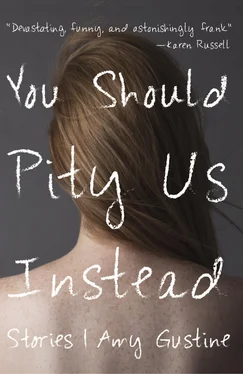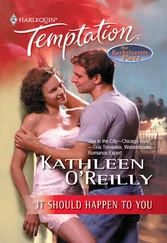Wicktoria breathed in a great quantity of air. Her whole chest rose, the papers with her false name, her pretend husband waiting in America, pressing against her breasts. She turned her face toward the high windows above and felt an intense desire to fly, to be able to rise up far away, just her, not even Fredek, into the enormous open space above her, the towering arch of the ceiling, where she could touch the cool tiles on the upper wall, curl up in the immense chandeliers under the gentle warmth of their electric light.
The man waved Goldene down to the next station at the elbow in the pipe and consulted his clipboard again. Fredek glanced at the Old Loaf to ask if he should go on up, but she was staring at the ceiling, her gray head twisting in circles. Fredek followed her eyes to the arched windows, where a faint snow fell against the gray light. He, too, thought of flying — out the windows, out into the new world of rules, laws, languages, and the only thing he feared was leaving behind the Old Loaf. His parents were dead, but she had saved him. He looked at her wrinkled, spotted hand. The knuckles were especially wide and flat, like a man’s. She wore a gold band that had grown too tight some time ago and now sat in a permanent depression which made it seem that removing it would require amputation. Fredek took the hand in his and squeezed it.
Hauss, so miserably slow, seemed to have been manhandling the poor girl for hours. Finally he’d waved her down to Spencer.
“Your name?” Spencer asked, his voice almost a whisper. Her high-necked blouse made it impossible for him to see if she had a mole like Laura’s, a soft-brown spot, perfectly round, just above the clavicle.
She didn’t reply, so he asked loudly if she knew English.
“No,” she shouted in Yiddish.
Another Jew. Spencer wondered if she was trying to escape the Pale of Settlement the Russians had set up.
He asked in his limited Yiddish where she was from. The girl looked at him with that expression, the way they all stared, defiant and vacant, resentful, assuming you had something against them, which you didn’t.
“Oh, for God’s sake, I don’t have time for this.” He snapped some papers out of her hands. Macia. He was fairly sure that was Miriam in English. “Miriam, where’s your husband?” It wasn’t his job to ask these questions, but really, what was a woman her age doing coming to America alone?
She said something he didn’t understand, this time in Polish. Why was she switching to that awful language? Did she think he was a bohunk? That he might understand it any better than Yiddish?
The old woman behind Miriam took several steps forward, then stopped under his glare and spoke in Polish to the girl.
“I’m not ready for you yet,” Spencer said sternly, hoping his tone, if not his words, would convey the message.
A boy took the old woman’s hand and pulled her away, mumbling “sorry” in English. Spencer frowned a warning, and went back to Miriam.
He was going to just wave the girl through — she was clearly not insane — when he noticed her eyes. Red, puffy. He wiped his hands slowly, rubbing his chalk-laden fingers white again. Then he cupped her jaw. She looked frightened. “It’s all right,” he whispered. “I just have to check your eyes.” Instead of using the buttonhook, he took her fragile, blue-veined lid between his thumb and forefinger. The girl muttered something in Yiddish. He caught the word “don’t.”
“It’s okay,” he muttered, but she pulled away from him, shaking her head and blinking.
“Healthy!” she said in English.
And so she was. No granules, no weeping. At most, she had viral conjunctivitis. More likely, she’d just been crying. “I thought you didn’t speak English,” Spencer said flatly.
“A little,” the girl replied.
If he marked her with a CT and they held her over for examination, Spencer would have a chance to speak to her. He glanced behind him out the window — the gray swirling day, the Statue of Liberty in the distance. If it were sunny they could sit in the wooden folding chairs on the dock and watch ships come in. He would teach her English, then explain America, where to live, how to get a job, warn her against the charlatans on the trains and in the bus stations. She would grow to depend on him. At the board of inquiry he would defend her, explain that his diagnosis had been overly cautious. She’d be indebted.
Spencer waved the boy behind Miriam in line up to him. The old woman followed.
“Do you speak English?”
“Some words,” the boy said.
“Your name?”
“Fredek.”
Spencer nodded. “Frederick,” he immediately amended the name by adding a syllable, “you tell her what I say, all right? You can do that?”
Frederick nodded.
“Ask her how old she is.”
“Twenty-three,” Frederick translated.
A year younger than Laura. Dr. Spencer smiled. “Ask her if she is alone.”
“Yes,” Frederick said.
“So she’s not married?”
“No, sir.”
“How is she going to make a living?”
Frederick shook his head.
“Money,” Spencer said, “how will she make money, live, pay rent, buy food.”
Frederick nodded and asked Miriam. She said she was a seamstress and she was meeting her brother, who’d come over last year.
Spencer reached out slowly and touched her hair, winding a lock around his finger. It was just like Laura’s. Even dirty, it felt like hers, crackly autumn leaves in huge piles. Miriam pulled away, looking to Frederick for an explanation. Frederick shrugged. The old woman addressed the boy. He answered her in a word.
Spencer spoke sharply, “You are not up yet. Tell your mother to be quiet.” Hauss had gone through two more people. They waited respectfully several feet away.
The boy said something to the old woman. She replied and Frederick began to translate, but Spencer waved him off, nodding toward Miriam. “Tell her to unbutton her blouse.” He felt sure she had the mole, and he wanted to see it.
Frederick translated, but Miriam pulled her gray shawl more tightly around her shoulders and glanced at the old woman, who stepped forward and spoke. Frederick translated. “Sir, it is a problem, uh, young woman,” he nodded at Miriam, “she is…” He stumbled. “Not want to open blouse, not with men.”
“It’s a medical exam. You have to submit,” Spencer said. Frederick didn’t translate. Spencer slapped him on the arm. “Boy, tell her what I said. People are waiting!”
Frederick told the two women something. Spencer was beginning to doubt he could speak English all that well.
“I need to check her out,” he said. “I’ll take her down to the nurses. Tell her to come with me.”
Frederick explained this to Miriam, who took a step back, next to the old woman. The woman put her arm around the girl and told the boy something. Frederick hesitated, whispering to the old woman.
Spencer reached out for Miriam’s arm. “Come with me.”
She pulled away from him. “No,” she said in English.
The boy said, “She is my sister. Where are you taking her? She is with us.”
“You said she was alone. What do you mean she’s your sister?”
“I…” Frederick stumbled again, then listened for a moment to the old woman. It was clear to Spencer there was something fishy going on.
“She is my sister,” the boy repeated.
Spencer demanded their identification papers. “You don’t have the same last name. Now leave us be, step aside.” He shoved Frederick, who stumbled into the old woman. She spoke sharply to Spencer, clearly reprimanding him for pushing the boy.
Spencer tried to talk above her. “I need to get this girl to the infirmary. She needs to be examined.” He grabbed Miriam’s arm. She yanked it away. He grabbed again and tried to pull her down the line.
Читать дальше












